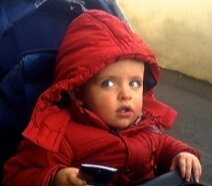Mathias: Grounded Hope In Ireland
A Mother's Story

I know that I’m not supposed to say that. As an ASD mom, I am supposed to embrace hope; voice it, nourish it; spread it; throw buckets of it on any doubt that dares to flame around my potential-brimming son.
Hope is the theme of the Lifetime television movie in which our culture longs to cast us. This movie begins with my husband and me spitting in the face of our son’s diagnosis and the pessimistic projections of those who made it; continues as we press against the winds of absent language, challenging behavior, and delayed toileting; and ends when we have beaten the odds into the dirt. In the final scene, as our little Mathias tears triumphantly through his Rachmaninoff or solves the insoluble Good Will Hunting-type equation instantly in his head, the camera finds his father and me wearing an identical expression: very proud, but not surprised. For we, alone against the world, have never lost hope.
In real life, as it happens, we couldn’t lose hope if we tried. It’s been playing hide-and-seek with us for years: Look, a flash of eye contact! Oops, gone again, but over there, did you catch that new word? Most of the time, of course, hope does the hiding and we do the seeking -- but not always. We might spend weeks looking for it, as for a contact lens in a carpet, and then just when we’ve given up, it jumps right out at us: oh my God, look at him go on that i-Pad!
And at those moments, of course, we breathe a sigh of relief and joy. For us as for all autism parents, hope is air. Hope is light. Hope is bread and water and sky. Hope is our life.
All that said, hope can also be a bitch on wheels.
At first, hope seemed perfectly nice.
“Your best hope,” we, like so many others, were told when our son was diagnosed at two-and-a-half, “is to get him at least 20 hours a week of early intervention in the form of Applied Behaviour Analysis.”
At that time, of course, we didn’t know what that actually meant:
“Now, in order to follow this recommendation, you will probably spend an absolute fortune in time and money. Even if you don’t have to move or mortgage the house or go to court to access decent ABA, you will often feel physically, mentally, and emotionally exhausted as you strive to implement it – and there will be times when you’ll be hard pressed to see what, if any, good it’s doing. Meanwhile, many people – speech therapists, psychiatrists, relatives, nutritionists, neighbors, educators, spokesmodels – will tell you flat-out that you are doing the wrong thing, or that you are doing it in the wrong way: using the wrong people, targeting the wrong goals, arranging the wrong schedule. Some will insist that all this Pavlovian carry-on would be unnecessary if you just tried a certain diet, powder, cream, headset or tent. If your family life has always been solid, it is likely to crack; and if it has always been fragile, it is likely to burst into subatomic smithereens. And in the end, once you’ve given your heart, your soul, your strength; your days and nights, your dreams, your memories, your mind and -- to some unavoidable degree -- your other children to all this effort, your son may turn out to be a functional – even fantastic! – member of society. Or he may end up as an intellectually disabled and/or emotionally disconnected dependent for life. No one can say for sure.”
Perhaps unsurprisingly, no one actually said this to me when our son was diagnosed. But it didn’t take long to see that it was all true. At that point, I split in two. One part of me put my Scarlett O’Hara on, grabbed myself a handful of plantation soil, and vowed to battle for my boy to the end. The other part just wanted to lie down for a big nap, to be woken only when the magic synapse pills were ready.
“Now, in order to follow this recommendation, you will probably spend an absolute fortune in time and money. Even if you don’t have to move or mortgage the house or go to court to access decent ABA, you will often feel physically, mentally, and emotionally exhausted as you strive to implement it – and there will be times when you’ll be hard pressed to see what, if any, good it’s doing. Meanwhile, many people – speech therapists, psychiatrists, relatives, nutritionists, neighbors, educators, spokesmodels – will tell you flat-out that you are doing the wrong thing, or that you are doing it in the wrong way: using the wrong people, targeting the wrong goals, arranging the wrong schedule. Some will insist that all this Pavlovian carry-on would be unnecessary if you just tried a certain diet, powder, cream, headset or tent. If your family life has always been solid, it is likely to crack; and if it has always been fragile, it is likely to burst into subatomic smithereens. And in the end, once you’ve given your heart, your soul, your strength; your days and nights, your dreams, your memories, your mind and -- to some unavoidable degree -- your other children to all this effort, your son may turn out to be a functional – even fantastic! – member of society. Or he may end up as an intellectually disabled and/or emotionally disconnected dependent for life. No one can say for sure.”
Perhaps unsurprisingly, no one actually said this to me when our son was diagnosed. But it didn’t take long to see that it was all true. At that point, I split in two. One part of me put my Scarlett O’Hara on, grabbed myself a handful of plantation soil, and vowed to battle for my boy to the end. The other part just wanted to lie down for a big nap, to be woken only when the magic synapse pills were ready.

Sometimes, however, I still want that nap.
Sometimes, I just want the gummy bears and the trampoline and Mathias’ favorite scene from Chitty Chitty Bang Bang to be the gummy bears and the trampoline and Mathias’ favorite scene from Chitty Chitty Bang Bang, not reinforcers. Sometimes, I just want his toys to be his toys, and not variously-preferred items. Sometimes, when he is throwing a tantrum in the supermarket door, I just want to give him what we both know he wants – another M&M-eyed gingerbread cookie from the display case -- so that he will stop, and never mind about encouraging negative behavior. Sometimes, I just want my little boy’s good moments and bad moments to be like any little boy’s good moments and bad moments; just life’s little snapshots, not wellsprings of faith or fear over what they might mean or where they might lead.
Sometimes, I want to pack up this giant intervention, ship it out to sea, and let the kid jump for joy on the beach without a thought as to whether he is jumping appropriately.
But no siree Bob, that’s not gonna happen. Hope won’t hear of it. My husband and I still have hope – real hope – that our boy is going to have a happy, productive, truly connected human life. Bit by arduously- extracted bit, that hope keeps getting bigger, and shinier; more demanding, and less forgiving all the time. And as long as we have that hope, we will do every last thing it tells us to, no matter how tired or discouraged we get; no matter how insistently consistent we have to be; no matter how rational the voices of surrender may sound.
Hope is an arrogant flirt. Hope fully expects that if it whispers the slightest hint of success, we will slavishly beg for more . And that, if it gives us any real gift of progress, we will follow it anywhere.
And you know what? We will.

Which road to take hasn't always been clear to Mathias's family, but they were fortunate to connect with Dr. Sharon Reeve of Caldwell College in NJ, USA. Dr. Reeve is Department Chair and Professor of Applied Behavior Analysis and Director of the Autism Center at Caldwell College, and through the magic of Skype were able to conduct regular team meetings with local experts and staff, through working together, achieve remarkable improvements in Mathias's life. Dr. Reeve's contact info: